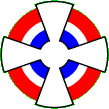|
During 1935,
the designers of IK-2 - Ljubomir Ilic and Kosta Sivcev, were joined by
Slobodan Zrnic in the design of a new private venture single-seat fighter
for the Rogozharski AD factory in Beograd. This aircraft was designated
IKZ or IK-Z. The similarity of the Cyrillic "Z" and the number
"3" led to a confusion, and as a result the aircraft is known
as IK-3 in common usage. Rogozharski AD received the contract for a single
prototype in March 1937, and it was completed and flown for the first time
in the end of May 1939. It was powered by a Hispano-Suiza 12Y29 engine,
rated at 920 hp at an altitude of 3.600 m. It carried an armament comprised
of a engine-mounted 20 mm HS 404 cannon and two fuselage-mounted 7,92 mm.
machine-guns. It was of mixed construction, with plywood-covered wooden
wings and a steel-tube fuselage with wooden stringers, metal skinning forward
and fabric aft. After successful tests, an initial contract for 12 series
produced IK-3 was signed in November 1938, but because of the prototype
crash on 19.01.39 during a pull-out from a terminal velocity dive, which
caused the starboard wing to collapse, the series IK-3 had a modified wing
structure, a new cockpit canopy and landing gear fairings. The HS 404 cannon
was replaced by an Oerlikon FF 20 mm. cannon (used on the Messerschmitt
Bf-109E-2, which was in service with the VVKJ), while the Hispano-Suiza
12Y29 engine was replaced by the Avia-built (Czechoslovakian) Hispano Suiza
12Ycrs engines (the ones previously used on the IK-2). The first six IK-3
were completed in March 1940, and the following six in July 1940. A further
series of 25 IK-3 were ordered and were under construction and a prototype
fitted with the Daimler Benz DB-601A engine (also used on the Bf-109E-2)
was constructed, but none of them were completed before the German invasion
in April 1941. During the invasion, the VVKJ had only 6 IK-3 operational,
and all of them were in the 51st Fighter Group (51va Lovacka Grupa), based
in the Zemun airfield near Belgrade, which were in the 6th Fighter Wing
(6ti Lovacki Puk). These fighters fought during the bombardment of Belgrade
on 06.04.1941 and 3 of them were destroyed during the fought, but the IK-3
fighters destroyed 10 German planes. The remaining aircraft fought in the
following days and retreated with the other surviving planes of the 6th
Wing on the Bijeljina airport where most of them were destroyed by a German
air attack during the night of 11-12 April, while the remaining IK-3 aircraft
(along with others) were burned on the Veliki Radinci airstrip, not to
fall into the hands of the enemy.
|
Technical information |
 Ikarus
IKZ
Ikarus
IKZ Ikarus
IKZ
Ikarus
IKZ